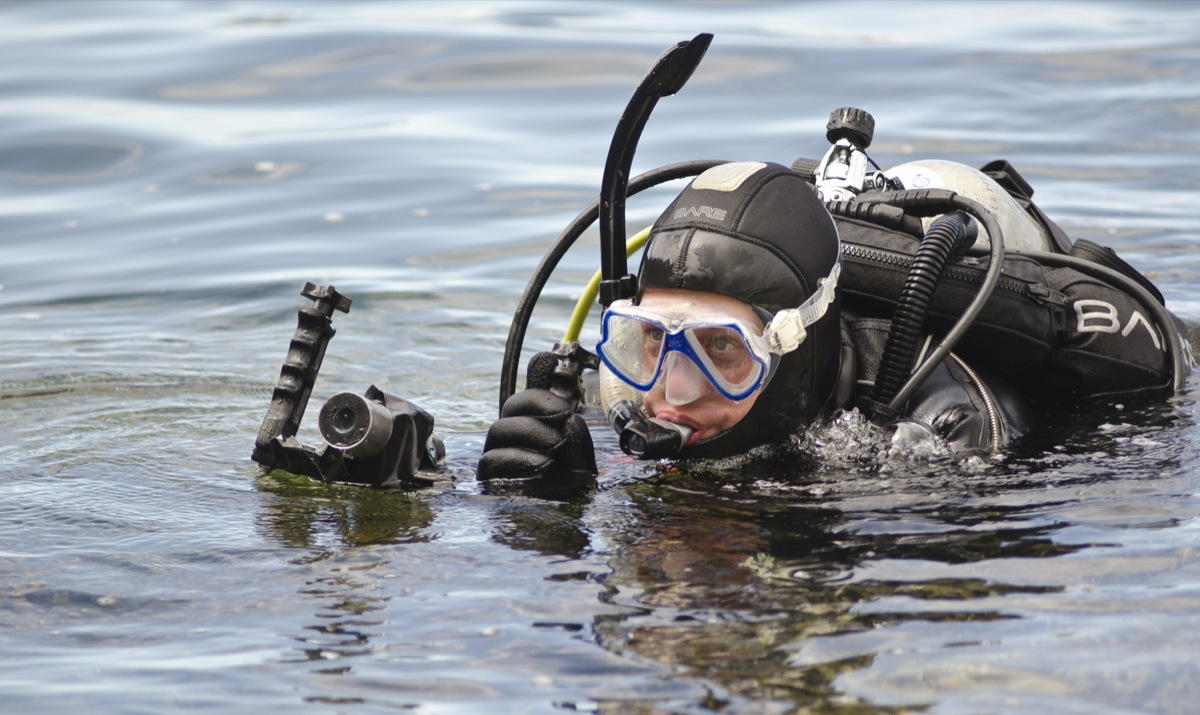
Using a Sub Eye camera, diver Mike Irvine is able to transmit underwater footage to viewers all over the world. –Provided (photo)
Mike Irvine comes from a long line of divers. His grandfather was an engineer who helped develop the Newtsuit, an atmospheric diving apparatus resembling a metal spacesuit. His father met Irvine’s mother as a diving instructor, and works with Aqualung Canada. Now, this latest Irvine is carrying on the family tradition, aiming to bring the wonders of the ocean to new audiences with the Fish Eye Project, a non-profit initiative that broadcasts live dives around the world.
The next event, a shipwreck dive, is scheduled for Oct. 2 and will be available to view live on YouTube and at the Robert Bateman Centre. The tour is interactive, allowing the audience to communicate with Irvine through an online chat box, who relays their questions to the diver as they introduce the shipwreck and the marine life within it.
“It’s kind of like going to a movie theatre,” says Irvine, “and then you can see your actors, but they’re underwater somewhere else in the world and you can actually talk to them.”
The project began when Irvine, now co-chair of the Fish Eye Project, began experimenting with underwater video, developing a new housing for an off-the-shelf GoPro camera that could support a tether to the surface. Combined with a microphone-equipped diving mask, he could narrate live underwater tours. Around the same time, he met Maeva Gauthier, then a masters student at UVic, who led undersea biology seminars for high school students that focused on the marine life around the float homes of Fisherman’s Wharf. Irvine’s technology and Gauthier’s lessons proved to be a perfect fit, and they began streaming the dives. As the project became more popular, Gauthier, now chair, registered the group as a non-profit specializing in public awareness, bringing topics reserved for academics into the mainstream.
“There’s a big gap between marine researchers and the public,” says Irvine. “They’re actually having a really difficult time getting their message out, so something that we see ourselves doing is kind of like a TEDx underwater . . . because we need to illuminate what’s going on, the research that’s being done.”
For Gauthier, who grew up in landlocked Mont-Tremblant, Quebec, the streaming live dives provide an opportunity to connect people with the ocean, particularly those who don’t live near it.
“With Fish Eye, we really hope to connect more people with the underwater world, no matter where they are. So even if they don’t live close to the ocean, they can still feel that they are connected to it and that it’s important.”
In the upcoming shipwreck dive, the Fish Eye team will examine how the wreck acts as an artificial reef, describing the marine life to viewers from around the world, who are encouraged to send questions to the team. Classrooms from across the country will also be watching. Gauthier hopes that the live dives will increase public interest and awareness in ocean conversation.
“For me,” says Gauthier, “education is a crucial part for scientific people to share their knowledge and share what [they] know about these ecosystems, so I really like this quote from Sylvia Earle: ‘With knowing comes caring,’ and if people know more about what lives down there, there’s a chance that people will care more about it.”
For more information on the upcoming live dive, visit fisheyeproject.org.






